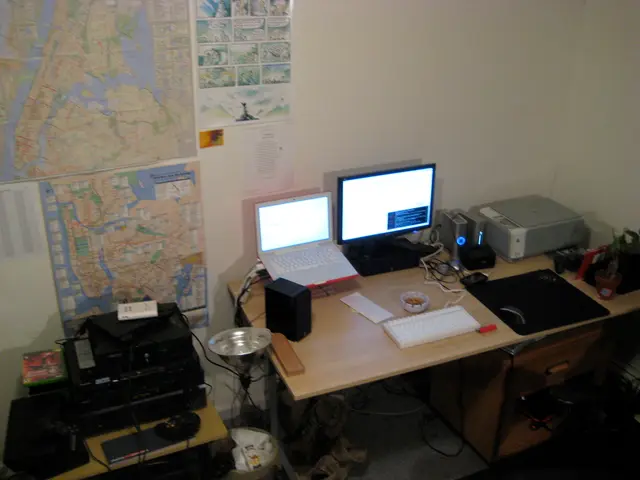Fresh Take on Israel's Aggressive Move Against Gaza
Israel intends to assert authority over food resources and supply distribution in Gaza.
In a controversial turn of events, Israel's Cabinet has agreed to intensify its grip on Gaza, proposing to seize more land and relocate Palestinian residents to a designated zone, with life-sustaining supplies provided by US security contractors utilizing facial recognition technology.
This bold decision marks a drastic shift in Israel's ongoing conflict with Hamas in Gaza, a move that the United Nations denounces as inhumane. The proposed measures would force the closure of numerous soup kitchens and aid centers across the territory, restricting food resources to an Israeli military-guarded area in southern Gaza.
According to a senior defense official, this new military strategy, codenamed Operation Gideon's Chariots, would initially be suspended until President Trump completes his upcoming visit to Gulf Arab countries to allow for a ceasefire and potential hostage exchange with Hamas.
The intricate details of this aid plan have been shared with NPR by six sources, including current and former US and Israeli officials, who wished to remain anonymous to discuss unannounced aspects of the charity proposals.
Israel insists that this plan will isolate Hamas from aid distribution and lower the group's power, which continues to hold 59 hostages from its vicious Oct. 7, 2023 attack on Israel, according to Israeli government data. Israel's retaliation has resulted in more than 52,000 Palestinian casualties, as reported by Gaza health officials.
The United Nations and several organizations currently managing aid operations in Gaza, briefed on the plans, have expressed their refusal to participate, stating that the scheme contravenes fundamental humanitarian principles and seems designed to reinforce control over life-sustaining items as part of a military strategy.
Ending Aid Flow to Gaza
For over two months, Israel has been enforcing a ban on food and supplies, imposing its longest and most extensive blockade on Gaza to date. Bakeries and food kitchens have ceased operations, leading to widespread hunger and malnourishment among children.
Before they ran out of supplies, the U.N. noted that half of Gaza's population—approximately a million people—relied on daily meals from charity kitchens.
The new aid zone would encompass around four to ten aid distribution hubs, strategically located between two Israeli-held strips of land in southern Gaza—the Morag and Netzarim corridors. Israeli soldiers would secure the perimeter, but they would not be involved in the distribution process. An American security contractor, Safe Reach Solutions, along with a newly established foundation in Switzerland, would handle logistics, although neither group has commented on their expected roles in the endeavor.
However, the limited aid zones would not be accessible to a significant portion of the Palestinian population dispersed throughout Gaza, according to the U.N. and aid groups.
In northern Gaza, resident Bassem Shniwrah criticized the reported aid plan, stating, "This feels like we're being treated like animals."
The Biden Administration Rejected a Similar Plan, According to a Former Official
The Trump administration has yet to respond to Israel's proposed changes, but Trump has expressed the need for provision of food to Gaza. Trump is scheduled to visit Saudi Arabia, Qatar, and the United Arab Emirates next week.
A former U.S. official, speaking on condition of anonymity to discuss confidential talks, stated that Israel attempted to implement a similar aid plan during Biden's tenure, but the administration nixed it as a violation of international war laws through manipulation of humanitarian aid for military gains. The Trump administration has not exercised the same pressure on Israel regarding its conduct in Gaza.
Israel Reinforcing Military Presence with More Soldiers
Israel has announced the mobilization of tens of thousands of reservist soldiers to support the expansion of the Gaza offensive.
Far-right Israeli Finance Minister Bezalel Smotrich, on Monday, affirmed that this new strategy signifies a permanent policy shift.
"We are taking control of Gaza to stay—no more back-and-forth. This is a war for victory, and it's time to stop fearing the term ‘occupation.' We are defeating Hamas—they will surrender, not us," Smotrich declared.
Israeli officials assert that the new military plans will reinforce efforts to entice Palestinians to emigrate from Gaza, a notion echoed by Trump earlier this year.
(Anas Baba contributed from Gaza City)
Copyright 2025 NPR
- The United Nations and several aid organizations, briefed on Israel's new aid plan, have expressed their refusal to participate, stating that the scheme contravenes fundamental humanitarian principles and seems designed to reinforce control over life-sustaining items as part of a military strategy.
- In a statement, Israeli Finance Minister Bezalel Smotrich affirmed that the new strategy in Gaza signifies a permanent policy shift, asserting that Israel is taking control of Gaza to stay and that this is a war for victory.
- The Biden administration, according to a former official, had rejected a similar aid plan during its tenure, considering it a violation of international war laws through manipulation of humanitarian aid for military gains.
- In the proposed new military strategy, codenamed Operation Gideon's Chariots, life-sustaining supplies will be provided by US security contractors utilizing facial recognition technology to Palestinian residents in a designated zone in Gaza.
- Widespread hunger and malnourishment have been reported among children in Gaza due to Israel's enforced ban on food and supplies, which has resulted in the closure of numerous soup kitchens and aid centers across the territory.








